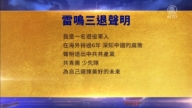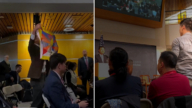【新唐人2011年8月9日訊】北京一家名叫「德育女學館」的機構,因為一堂《嫁個有錢人》的課程引發爭議。這家學館表示,開設的課程主要在提升女性內涵,名稱定為「嫁個有錢人」是因為這個名字更實際。大陸學者評論,這是社會墮落的一種現象。
據「德育女學館」創始人邵童介紹,學館於去年(2010年)5月底正式營業,目前共招收過2000多名學員。
而這個「嫁個有錢人」課程,被質疑是否就是叫人「釣大款」?而且課程資質如何界定?學員為何不接受採訪?是否提供男女配對?諮詢公司辦培訓是否違規?
邵童表示,他們的課程主要包括婚前及婚後,婚前課程主要有交友、防騙、提高情商愛商、與伴侶溝通的技巧,還有一些課程如化妝、社交禮儀等,「並不是像外界說的教你傍大款,而是提升女性的內涵,幫助她們在婚戀上取得成功。」
對於課程名稱,邵童表示,曾想過其他名字,但最終定為《嫁個有錢人》是因為這個名字更實際。
而「德育女學館」的工作人員丁先生在接受《新唐人》採訪時表示,課程是教如何識別真假有錢人,不被欺騙。
丁先生:「我們會告訴她們這種成功男人,一般他們成功的方式是甚麽樣的,個性是甚麽樣的,就告訴她這個。我們界定的這個『有錢的人』就是比自己的收入高、比自己經濟條件要好就算有錢人。一個人要掙2千塊 錢,她要嫁一個一個月掙2萬的,他就算是有錢人。」
中國獨立媒體人高瑜女士認為,這種培訓方式是敗壞人類的道德。
「這簡直是不可想像的,在一些電視的公開節目中竟然公開搞這一套,而且這些,我認為對社會倫理道德的這種重整和重建啊,它是一劑毒藥。 而且現在從大學教育,從各方面,它雖然政治課一點沒有減,主要讓你效忠於中共,但是呢,整個現在這個社會就是為金錢所左右啊,已經是把年輕一代的心靈都腐蝕掉了。」
英國BBC廣播電臺有文章質疑,「嫁個有錢人」能通過培訓實現嗎?婚姻講究的是緣份,要以愛情為基礎。最終是不是嫁給了有錢人,根本就與培訓無關。
孫文廣(前山東大學教授):「那麼這種現象呢,說明社會失掉了一些目標了。因為要找朋友應該看他有德有才,這個才是對的,不應該是有錢啊。 這個還是一種社會墮落的一種現象,去追求名利啊,女孩子追求進入豪門,千方百計地用各種方式要嫁一個有錢的人,這是對社會一種腐蝕的現象,腐敗的現象了。 」
據大陸媒體報導,這家企業自去年5月起正式對外營業,7、8月開始招收學員,至今不到1年,但相關負責人自稱:「已有過學員約2800名,目前正處迅速發展期。」
新唐人記者常春、林慧心、柏妮採訪報導。
Degradation: Marrying for Money
The Beijing-based organization, Deyu Female Institute,
came under fire for promoting a controversy course called,
“Marry a Richman.”
The organization says the course was designed
to enhance the female character,
but Chinese scholars say
the program reflects a definite decline in social morals.
The founder of Deyu Female Institute, Shao Tong, says that
the institute started in May 2010 and now has 2,000 students.
But does the course encourage
females to marry rich men?
How does one assess the quality of this program?
Why do its students avoid media interviews?
Do they provide match making services?
Do teachers break the law during their training classes?
Shao Tong said that their classes teach unmarried women
the techniques of making friends, communicating with men,
cheat-proof techniques, and improving their “EQ in love.”
They also offer make-up classes and socializing skills
“but we do not teach females how to seduce the rich,
but rather we teach them how to improve themselves
and their chances of marrying a rich man.”
Shao Tong said they did consider other names for the program,
however they stuck with, Marry a Richman,
because it sounded more pragmatic.
Mr. Ding, a staff member at the Deyu Female Institute,
told NTD that this class teaches women how to discern
whether a person is truly rich or not, and how not to get fooled.
Mr. Ding: “We tell them how rich people become rich,
what kinds of personalities rich men have, and so on.
We define a Richman as someone who earns a lot of money
and lives a prosperous life.
For example, if a female earns 2,000 yuan (US$310) a month,
and marries someone who earns 20,000 (US$3,100) a month,
then that is what we are talking about.”
Gao Yu, an independent China media professional, said such
training programs are designed to deteriorate people’s morals.
Gao Yu: “It’s unimaginable to have these programs on TV,
which is definitely detrimental to the social norms and morals.
In universities, political courses are still compulsory
and they are tailored so as to compel students
to be loyal to the Chinese Communist Party.
However, the whole society has been influenced by money,
which has had serious consequences on today’s youth.
A BBC radio article questioned the feasibility of
the Marrying a Richman program.
It said that marriage is based on love and affections,
and that the training course could do little
to foster a meaningful marriage.
Sun Wenguang, a former Shandong University professor, said:
“Such phenomenon marks a society that is missing
a fundamental understanding:
When a person gets married, she should not judge her partner
by how much money he earns, but rather on his character.
This is a sign of declining social morals.
It’s morally wrong for females to pursue fame and wealth;
to scheme to marry a rich man
so as to enjoy his material prosperity.”
According to Chinese media, the Deyu Female Institute
opened in May 2010, and began recruiting members in June.
The institute said that in less than one year,
over 2,800 students enrolled and the number is growing.
NTD reporters Chang Chun, Lin Huixin and Bo Ni


























